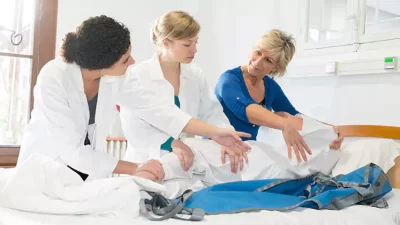Knee and hip joint pain is a common problem that many people face. While the pain experienced is usually very mild in the beginning, it can become severe if the patient does not seek treatment during the early stages. A study that was conducted in Spain determined that as much as 49.2% of older adults suffer from pain in their knee and hip joints. During the study, they asked 10,150 people to complete a questionnaire.
Painful symptoms of the knee joint were more common than painful symptoms of the hip joints. While only 23.8% of participants complained about hip joint pain, a total of 38.3% of the participants complained about pain in their knee joint. They also found that 51.6% of the participants who complain about these symptoms also reported that the symptoms had put limitations on certain functions.
What Causes Knee and Hip Joint Pain?
In order to understand what causes knee and hip joint pain, we need to discuss each one of these topics separately first. Pain experienced in these joints is sometimes related to some type of Arthritis, which could affect both parts simultaneously. In some cases, however, pain is only experienced in one of these regions and caused by another factor.
According to Arthritis Research UK, hip pain is often caused by pushing the body too much during exercise. This causes the soft tissue in the area to become inflamed or strained. When hip pain is caused by too much strain, the pain usually goes away within a couple of days. Should a problem with the hip joint develop, then the pain can sometimes also be felt in the groin area, as well the knee?
There are a variety of factors that can cause painful symptoms to develop in the knee joint. According to Mayo Clinic, one of the most common causes is an injury to the knee. The anterior cruciate ligament can tear, which causes the knee pain. Fractures, patellar tendinitis, and knee bursitis are also types of injuries that can cause painful symptoms in the knee. Apart from direct injury, mechanical problems, such as hip pain and a dislocated kneecap can also cause problems.

Knee and hip joint pain can also be caused by Arthritis. The most common types of Arthritis that can affect the hip and knees include:
Treatment Options
The treatment options for knee and hip joint pain depends on whether the specific condition that is causing the painful symptoms. In cases where the joint or tissue in the region has been injured, a doctor will usually analyze the condition and determine whether surgery or a cast is necessary. In many cases, a dose of anti-inflammatory medication can help reduce the swelling. The pain also usually goes away after a couple of days.
In cases where the doctor determines that Arthritis is causing the problem, a treatment plan will be required. The Clinical Trials reports that treatment for Arthritis can include both medical and non-medical options. Non-medical options include exercise, losing weight, stretching, yoga, and other techniques. Should the condition be more severe, medication might be required. This could include nonsteroidal anti-inflammatory drugs, Acetaminophen, Diacerein or even medication that is injected directly into the affected area. The specific type of medication that is used to treat a patient’s Arthritis depends on the type of Arthritis the patient has and the severity of their condition.

Preventative Measures
Preventing Arthritis is usually the best approach to avoiding these painful symptoms that are caused by the disease. There are many ways in which a patient can reduce the risk of developing certain types of Arthritis. Health Line reports that the following are all excellent ways to prevent Arthritis from developing:
- Eat fish that are high in Omega 3 fatty acids. Also, omega 3 is one of the common ingredients of relief factor.
- If you are overweight, try to lose weight until you reach a healthy weight. Use a BMI calculator to determine how much weight you should lose.
- Participate in regular exercise routines.
- Try to avoid injury to regions on the body where joints are located, such as the knee and hip. If you are playing any type of contact sport, a knee cap and other protective gear can help you avoid injury.
Conclusion
Knee and hip joint pain can be caused by a variety of factors. Even though the pain can sometimes develop due to too much strain, it is important not to ignore painful symptoms that develop in these regions. Pain in the hip joint and knee joints can be a sign of Arthritis. If such a condition is detected and diagnosed at an early stage, then treatment can provide better relief of the symptoms and even slow down the progression of the disease.
Read Next – How To Treat Hip & Groin Pain In Young Athletes?







 This article changed my life!
This article changed my life! This article was informative.
This article was informative. I have a medical question.
I have a medical question.
 This article contains incorrect information.
This article contains incorrect information. This article doesn’t have the information I’m looking for.
This article doesn’t have the information I’m looking for.